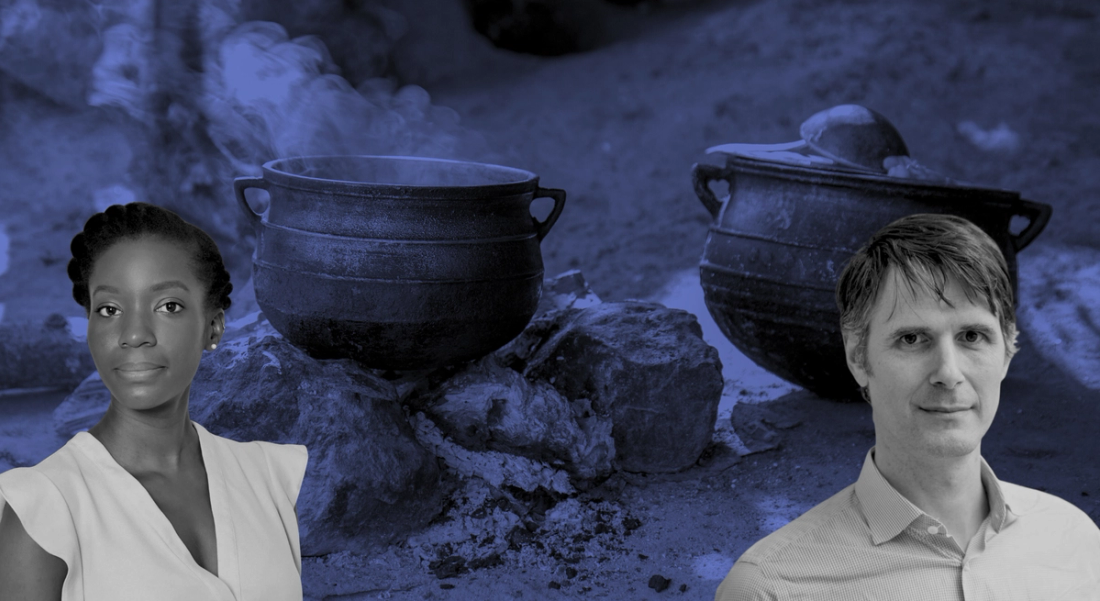How Does Research Reshape the People Who Lead It?

Research can transform more than data — it can transform the researchers themselves.
We asked two Columbia scientists to look back on a clean-cooking project in Ghana they participated in and speak frankly about what the work taught them.
During her PhD at Columbia, Misbath Daouda joined forces with her faculty mentor, environmental-health professor Darby Jack, to confront the smoky wood and charcoal fires that still fuel most Ghanaian kitchens. Supported by Columbia World Projects, their research team first measured why households in Ghana were not transitioning to cleaner cooking, then piloted a mobile app that delivers clean-burning fuel straight to families’ doorsteps.
The study promises cleaner air in Ghanaian homes, but it has equally reshaped its investigators. Daouda, now a professor at University of California, Berkeley, turned the lessons she learned into a teaching model for her own students. Jack, still teaching at Columbia, reaffirmed why hands-on inquiry sits at the heart of academia.
What first drew you to this project?
Daouda:
“I really wanted to work on a project that sat at the intersection of energy and health that was based in Africa and would generate tangible, measurable outcomes. What was particularly appealing about this project was the latitude for myself, as well as for other trainees to come up with their own research questions.”
Jack:
“We need better models for how to accelerate this transition to cleaner household energy. Most of the progress we’ve made so far is about what we would expect just from economic growth, as opposed to sector‑specific policies. We had the freedom to approach it in two phases, sort of an assessment phase and then an implementation phase.” The Columbia World Projects grant, he adds, “allowed us to build a team that was reflective of the places we were working,” opening the door for Daouda and other international students to join the project.
What surprises and new opportunities emerged?
Jack:
“I had not really thought about software much, and how software could help with clean fuel access.” Partnering with Ghanaian developers on the app sparked two new grant proposals for a different project on heat‑early‑warning systems and pulled the team into deeper talks with Ghana’s Ministry of Energy — conversations that blend epidemiology, technology, and policy in ways “I wouldn’t have otherwise thought possible.”
Daouda:
An unexpected opportunity arose when I was selected for a Microsoft Research PhD Fellowship “to extend on the work I was doing with low‑cost air‑pollution sensors in Ghana.” The fellowship provided “amazing computational resources, but also mentorship from Microsoft scientists whom I still interact with and who have frequently brought me into spaces that I didn’t think I would be entering.”
What did you learn from each other?
Jack:
“My approach to mentorship is to provide a platform, but also provide a lot of freedom for trainees to pursue their own interests. When the right sort of people and contacts come together, it can be a really, really powerful model.” He points to Daouda’s knack for “defining questions that were highly relevant to our core objectives, but also really relevant to her intellectual interests and career objectives.”
Daouda:
Working with Jack reframed how she designs studies. “Working within a policy‑relevant framework and trying to understand where the policy momentum is prior to launching into more specific questions is a really powerful strategy.” The habit, “helped me contextualize a lot of my research and maximize its potential impact,” she says. “I’ve also built the confidence to really see the value in my own research questions and to create a pipeline for students with my background. That is to say students who have similar potential but might not be eligible for the funding sources that Columbia relies on, which often have citizenship restrictions.”
What advice do you have for students or faculty interested in similar work?
Jack:
Solutions‑oriented research is essential yet still outside the traditional model. Training and evaluation frameworks are “less well developed” than in hypothesis‑driven science, but Daouda’s “trajectory is an existence proof that it can really lead to excellent outcomes for the trainee.”
Daouda:
“Definitely,” she would encourage others. The project experience gave her the confidence to pursue academia and to “diversify the spaces that we are in,” widening opportunities for the next generation of researchers.